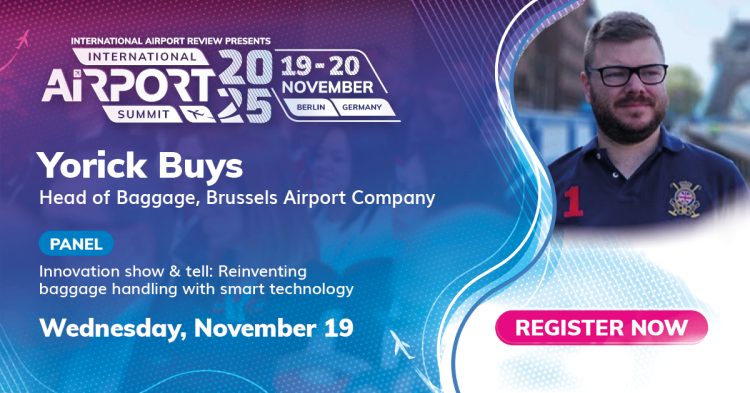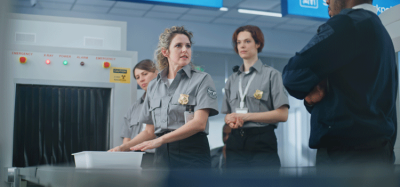Brussels Airport’s Head of Baggage, Yorick Buys on smart technology and sustainable design | International Airport Summit 2025 Preview
Posted: 22 October 2025 | Holly Miles, International Airport Summit, Yorick Buys | No comments yet
Yorick Buys, Head of Baggage at Brussels Airport and a speaker at this year’s International Airport Summit in Berlin, spoke exclusively to Holly Miles about how his airport is modernising its baggage handling system and the top technology trends he is watching.


Baggage handling is one of the most complex, high-stakes operations in any airport, yet often one of the least visible to passengers. For Yorick Buys, Head of Baggage at Brussels Airport, the challenge isn’t just keeping luggage moving; it’s rethinking the entire system for the future. This November, Yorick will share his vision at the International Airport Summit 2025, speaking on both ‘Innovation show & tell: Reinventing baggage handling with smart technology’ and ‘Winning strategies for a carbon-neutral airport reducing carbon footprint and saving energy costs in BHS’ sessions.
At Brussels, the aim is to be fully ICS (individual carrier system) and fully traceable. Yorick is overseeing the replacement of two sorters that have been running for over three decades — the oldest of their kind still operating in an airport anywhere in the world. “They are very old-school, metal, chain-driven dual tray sorters that work well, but need replacing. The trouble comes around sourcing spare parts for these older systems.”
“The challenge is doing that while the system is running near maximum capacity and processing over half of our airport’s volume,” he explains. “We can’t just take the old one out — we need to build a new, modern system alongside it.”
From physical strain to automated gain
One of Yorick’s key goals is to make the job of baggage handling safer and more sustainable for workers, as it is an aging workforce. “Baggage handling work hasn’t changed much in decades,” he says. “We want to modernise loading and move more towards batch loading so it’s less physically demanding and more consistent.” That means moving towards batch-built loading, reducing 200 manual positions to around 8–10 automated ones. “You can also work at a constant pace rather than being peak-driven, which we are currently. Today, baggage systems are made in a way that follow peaks, but by flattening the peaks and looking into which bags have a bit more time and where we can fill a container further in advance, we can lower the number of locations needed, but use them at a more constant pace.”
The breakthrough comes from rethinking the very logic of how baggage is organised: “Traditionally, baggage is loaded for individual flights, each flight has its own chute, and bags are processed as if they arrive in neat, predictable batches. But that’s not how it works in reality. Bags come in at different times and in different volumes, so we’re shifting from a flight-based mindset to a load unit–based approach. Instead of asking ‘how do we make the old way faster?’, we’re asking ‘is this even the right way to do it?’ By rethinking the process from scratch and working closely with airlines and handlers, we can design smarter systems that truly fit today’s operations.”
It’s not just about replacing muscle power with machines, it’s about rethinking the process entirely. Yorick and his team are exploring automated guided vehicles (AGVs), speed loaders, and robotics, but with an emphasis on human-robot collaboration. “We don’t want to simply replace one physically demanding task with another,” he notes.
Yorick’s top trends/technologies to watch:
- Batch-built loading, the future of baggage processing.
- AGVs,common in warehousing/logistics such as Amazon and have been for over a decade, but not yet widely adopted in baggage handling.
- Human-robot collaboration, robotic loaders that work with people rather than replacing them entirely, as human experience is so valuable and this is a “Utopia we should not strive for.”
- Wearable technologies and augmented reality, for example, Meta’s collaboration with Ray-Ban could help the baggage world when the technology matures so that handlers can scan bags just by looking at them.
Sustainability in motion
While baggage isn’t the highest carbon contributor at an airport because a lot of the baggage room is already electrified, Yorick still sees opportunity for greener operations but thinks suppliers are the best innovators in this space. “We challenge suppliers to deliver energy-efficient solutions that only run when needed. We’ve tested AGVs and vertical storage to reduce unnecessary movements, borrowing best practices from warehousing.”
Learning from leaders, leading by example
When it comes to baggage innovation, Yorick looks to other airports for inspiration. “Oslo Airport, operated by Avinor, is one of the leaders, they think like us but are a couple of years ahead.”
By attending and speaking at the International Airport Summit 2025 in Berlin, Yorick hopes to learn just as much as he shares. “I want to hear the challenges other airports face, how they’re addressing them, and see where we can create scale together. By working collectively, we can influence suppliers and drive innovation far more effectively.”
For Yorick, design is at the heart of the transformation. As one of Yorick’s favourite Steve Jobs quote reads: “Design is not just how it looks and feels. Design is how it works.” And for Brussels Airport’s baggage systems, the next chapter will be about designing processes that work smarter, for passengers, for staff, and for the planet.
Yorick Buys will be speaking at International Airport Summit 2025 on the both ‘Innovation show & tell: Reinventing baggage handling with smart technology’ on day 1 and ‘Winning strategies for a carbon-neutral airport reducing carbon footprint and saving energy costs in BHS’ on day 2. Want to discuss baggage innovation strategies with him and get his advice on something? Make sure you secure your place at the summit taking place in Berlin on 19-20 November by registering for your FREE ticket now.
About the interviewee
Yorick Buys is Head of Baggage at Brussels Airport. He is an experienced project team manager with a demonstrated history of working innovatively, by blending design thinking, lean managing and agile methodologies. Yorick is a very experienced BI team lead innovating the full operational reporting landscape at an airline. He holds an Engineer’s Degree focused on Aerospace Engineering from the Delft University of Technology.
The International Airport Summit is open for registration!
Date: 19 – 20 November 2025
Location: JW Marriott Hotel Berlin
At our flagship event of the year, we will dive into the future of airport operations, with expert-led sessions on passenger experience, innovative smart technologies, baggage handling, airside operations, data, security, and sustainability.
This is where global airport leaders come together to share insights, challenges, and real-world solutions.
Limited complimentary passes are available for eligible professionals – first come, first served!
Related topics
Autonomous Technology, Baggage handling, Innovation, International Airport Summit, New technologies, Workforce


















